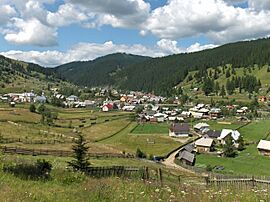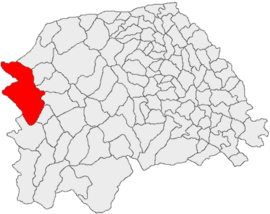Cârlibaba facts for kids
Quick facts for kids
Cârlibaba
|
||
|---|---|---|

Cârlibaba in July 2009
|
||
|
||

Location in Suceava County
|
||
| Country | ||
| County | Suceava | |
| Population
(2011)
|
Lua error in Module:Wd at line 1,575: attempt to index field 'wikibase' (a nil value). | |
| Time zone | EET/EEST (UTC+2/+3) | |
Cârlibaba is a small community, also called a commune. It is located in Suceava County, in northeastern Romania. This area is part of a historical region known as Bukovina. The commune is made up of six villages. These include Cârlibaba (the main village), Cârlibaba Nouă, Iedu, Șesuri, Țibău, and Valea Stânei.
Other Names for Cârlibaba
Some parts of Cârlibaba have other names in German. For example, Cârlibaba Veche is known as Mariensee. Cârlibaba Nouă is called Ludwigsdorf.
People Living in Cârlibaba
The people living in Cârlibaba come from different backgrounds. This is called their ethnicity. They also have different religious beliefs.
According to the 2002 census, most people were Romanians (about 85%). About 9% were Germans, and 5.4% were Ukrainians. Most people (about 86%) belonged to the Romanian Orthodox Church. About 13% were Roman Catholic.
By the 2011 census, the numbers were similar. About 89% of people were Romanians. Around 5% were Germans, and 4% were Ukrainians. The main religion was still Romanian Orthodox (about 85%). About 12% were Roman Catholic.
History of Cârlibaba
![]() Moldavia (1388–1775)
Moldavia (1388–1775)
![]() Habsburg Monarchy (1775–1804)
Habsburg Monarchy (1775–1804)
![]() Austrian Empire (1804–1867)
Austrian Empire (1804–1867)
![]() Austria-Hungary, Cisleithania (1867–1918)
Austria-Hungary, Cisleithania (1867–1918)
![]() Kingdom of Romania (1918–1947)
Kingdom of Romania (1918–1947)
![]() Romanian People's Republic (1947–1965)
Romanian People's Republic (1947–1965)
![]() Socialist Republic of Romania (1965–1989)
Socialist Republic of Romania (1965–1989)
![]() Romania (1989–present)
Romania (1989–present)
Cârlibaba was once part of the Principality of Moldavia. This was a large area that existed until 1774. Then, it was taken over by Austria.
Under Austrian rule, many German miners came to live in Cârlibaba. They were called Zipser Germans. They were part of a larger German community in the Bukovina region.
During World War I, a battle took place in Cârlibaba. This was from January 18 to 23, 1915. Polish soldiers fought against Russian troops. The Poles won this battle. In 1932, a memorial was built near the Saint Louis church. It honors the Polish soldiers who died there.
Gallery
-
The house on the rock (Romanian: Casa de pe stâncă)
See also
 In Spanish: Cârlibaba para niños
In Spanish: Cârlibaba para niños
 | Misty Copeland |
 | Raven Wilkinson |
 | Debra Austin |
 | Aesha Ash |












